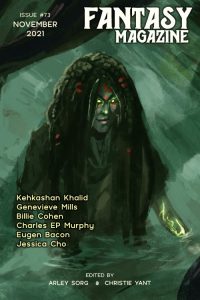Suite 13 by David J. Schow : Review by Paul Di Filippo
 Suite 13, David J. Schow (Subterranean 978-1645241621, hardcover, 384pp, $45.00) November 2024
Suite 13, David J. Schow (Subterranean 978-1645241621, hardcover, 384pp, $45.00) November 2024
When I reviewed Cixin Liu’s story collection A View from the Stars a few months ago, I made a big deal of how Liu had pulled a radical move by issuing a hybrid volume of fiction and non-fiction. Well, now comes an identical blend from master of shocks David Schow, half tales, half essays. There must be something in the air telling us that both real life and imaginary life flourish better when one serves as counterweight to the other. The Middle Path! But maybe I should wait till the third such volume from another author appears, before calling out a trend.
In any case, the Schow collection could not be more different in its essence from the Liu assemblage. Whereas Liu offer cool, cerebral work, Schow tosses out hot-button grenades of narrative and ideation. I last reviewed him for Asimov’s in 2018, handling his collection DJStories. I said then: “Schow’s fiction…can be seen as stemming from the same cultural forces that created cyberpunk: a desire to shatter old cliches and reinvent a genre. While many of his tales revel in gruesomeness, he never betrays the humanity of his characters, and in fact a certain mellowing arc can be discerned in his career.”
The stories in Suite 13 (and 99% of the nonfiction) are all very recent (four are seeing the light of day for the first time) and they do reveal a more “mature”—if I can use such a swear word—writer, confident of his skills and effects, and using just enough juice to electrify the reader without inflicting fatalities. If I had to sell him in a Hollywood pitch, I’d say, “Half Harlan Ellison, half Charles Bukoswki, with a frosting of Shirley Jackson.”
I can’t cover all the entries on the vast Table of Contents, so we’ll survey some favorites. I’ll alternate between fiction and non-fiction, just as the book does. This checkerboard arrangement works well for the reader, I think.
The book opens strongly with “Red Meat Flag”, which seems at first to be a simple cop versus weird serial killer tale, but which explodes laterally. Purely naturalistic, this tale illustrates that Schow does not always rely on the uncanny for his effects.
We run up next against “Blame Hermes”. This autobiographical piece is situated sensibly, early on, to offer the reader insight into Schow’s character and history.
Next on stage is “Draggers”, a great slice of Eisenhower-era juvenile delinquency with a spooky twist. This segues into “The Fearsome Fifties”, which chronicles Schow’s great love for and knowledge of the classic B-movie cinema. This telling observation—“The Fifties were the age when science fiction and horror films graduated from the previous idiom of mad scientists…to science that was itself insane.”—really nails the societal and psychological effect of that epoch.
Portraits of Robert Bloch, Fredric Brown, Richard Matheson, John Wyndham and Joseph Stefano (a fellow instrumental in the success of Outer Limits) show that Schow is a loving extoller of the virtues of his heroes.
In his story notes, Schow has some interesting thoughts on theme anthologies and playing in the playgrounds of other writers. He counts it an honor and privilege to participate in such. Several of the stories fit this metric. One is “Long Black Veil,” where inspiration derives from Johnny Cash—certainly one of the eeriest of CW singers, at least from time to time. Our narrator wants to kill his romantic rival, and does. “My slug hit Guy like a spear of rebar flung from the back of a speeding truck.” Alas, in true EC comics fashion (a compliment to be sure), he discovers that rivalry can continue beyond the grave.
One of my favorite essays is titled “a.k.a Trevanian”. It is a masterful history and literary analysis of the fellow famous for The Eiger Sanction, and could serve as both lively tribute and encyclopedia entry.
Even before reading the story note to “Twenty Dead Men”, I knew it was a balls-to-the-walls tribute to Donald Westlake’s Parker books. Schow reveals that this story forms just a chapter in an eventual novel about his hero Proctor, a consummation devoutly to be wished.
“Caving” might be deemed the story most resembling a chiller from Stephen King. Two teens go amateur spelunking and have an uncanny encounter. End of tale? Not at all, for that encounter reverberates down the decades.
The final piece of fiction, “Normal,” is a brilliant mix of SF and horror. A plague that randomly renders some juveniles into savage murders overtakes the planet. From this one novum, Schow spins off a wealth of sociological changes, including the need for a class of exterminators of the aforementioned teens. Quite appropriately, our narrator is one such. And then he encounters an assignment that is much more than routine.
Schow’s “Afterword” further reveals—as if we had any doubts—a humble yet confident man dedicated to honing his skills and not giving up his Muse in the face of a generally uncaring world. “So achieving a story collection…remains a cause for celebration. The similarities between short story books and little parties are not accidental.”
You will feel a heady kick to be invited to this particular party—just don’t mind the blood trail seeping out from under the closed bathroom door.
Interested in this title? Your purchase through the links below brings us a small amount of affiliate income and helps us keep doing all the reviews you love to read!
 While you are here, please take a moment to support Locus with a one-time or recurring donation. We rely on reader donations to keep the magazine and site going, and would like to keep the site paywall free, but WE NEED YOUR FINANCIAL SUPPORT to continue quality coverage of the science fiction and fantasy field.
While you are here, please take a moment to support Locus with a one-time or recurring donation. We rely on reader donations to keep the magazine and site going, and would like to keep the site paywall free, but WE NEED YOUR FINANCIAL SUPPORT to continue quality coverage of the science fiction and fantasy field.
©Locus Magazine. Copyrighted material may not be republished without permission of LSFF.









